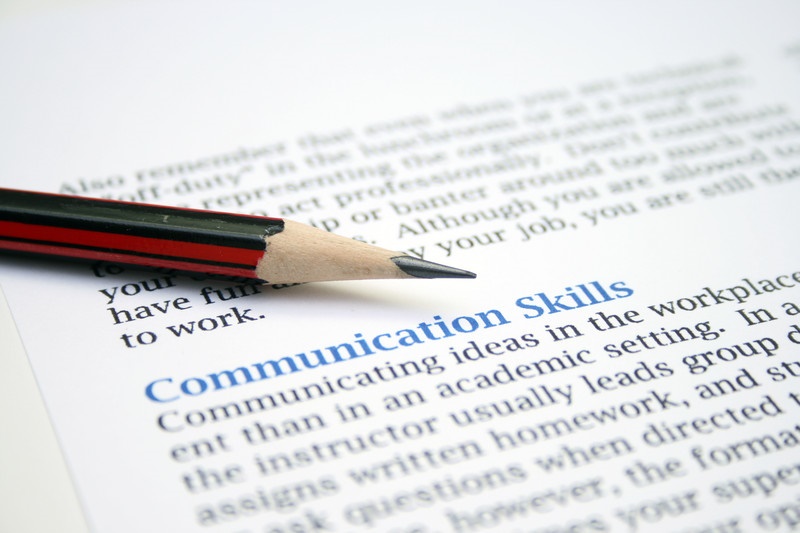
Communication is consistently cited as one of the most—if not the most—crucial factors to building and preserving healthy relationships. As reported by the PBS program The Emotional Life:
“How couples behave when solving problems together or arguing can predict the character and success of their relationship. A raised eyebrow, a hand on the arm, or a greeting all may seem like small things, but research shows that the quality of everyday interactions can make or break a relationship.”
Similarly, communication skills are just as important at work: one 2014 survey of nearly 600 employers found that communication skills are the most in-demand skill set among employers. In fact, of five leading skill sets employers consider most valuable when making a hiring decision, communications skills top the list.
From maintaining healthy relationships to getting hired to being promoted, communication impacts nearly every aspect of our lives. Working to develop our communication skills, then, isn’t a bad place to start if we want to make some positive changes.
How to become a highly effective communicator
Coming to be an effective communicator is not complicated, but it will call for some basic skills and the motivation to practice.
The first step is to acknowledge that the goal of any communication situation is an honest, open-ended exchange of information where all individuals can be heard and appreciated. This calls for assertive and articulate speaking abilities, but, just as critically, requires robust listening skills.
The reality is, listening skills may be the most vital part of communication. The reason is very simple: if you are not able to understand what is being said, you won’t have the ability to formulate a relevant and meaningful response. This failure to understand is the root cause of countless misunderstandings, quarrels, and bad feelings.
Developing listening skills, then, is the single most significant thing you can do to become a more effective communicator. And while active listening is often difficult in its own right, hearing loss makes things even trickier.
Hearing loss and the barriers to active listening
Active listening necessitates dedicating all attention to the speaker. Only by completely comprehending the message can you produce a relevant and substantive reply, and that’s why ineffective speakers are almost always distracted listeners.
But what triggers the distraction?
Here are four typical sources of distraction and how hearing loss tends to make things even worse:
Distraction # 1: Stress
If you’ve ever been highly stressed or anxious, you recognize how difficult it can be to focus your attention. You’re more inclined to be focusing on on your personal thoughts and feelings rather than on the speaker’s, and you’re likely to miss out on essential non-verbal signs and to misinterpret what others are saying.
Regarding stress, hearing loss itself is a leading source. You may become anxious about missing important information or coming up with embarrassing replies. And, the battle to hear speech in the presence of hearing loss is a source of anxiety and strain itself.
Distraction # 2: Lack of focus
Active listening is challenging because our minds have the normal tendency to wander. You can’t both listen to the speaker and daydream, check your email, text message, and prepare what you’re going to say next. Staying inside of the present moment and focusing on the speaker is the only method to pick up on the subtle points of the speaker’s communication.
Hearing loss produces a lack of focus because it removes you from the present moment. If you’re working to understand what the speaker just said, you’re also missing out on what they’re saying at the moment. The continual catch-up virtually ensures that you’ll never properly understand the message.
Distraction # 3: Misunderstanding
Stress and lack of focus can both force you to misunderstand the message. This introduces the possibility of you becoming upset or agitated with a message that the other person never actually meant to send.
This at the very least wastes time and in the worst case produces bad feelings. Not to mention the irritation of the person who is consistently misunderstood.
Distraction # 4: Lack of confidence
If you lack confidence, you’ll find it difficult to assert yourself while socializing. You’ll probably also be preoccupied with what the other person thinks rather than on the content of what they’re saying.
Hearing loss makes things much worse, as you can imagine, because your misinterpretations could be thought of as a sign that you just don’t understand the message. If you’re regularly asking for clarification on simplistic points, it makes it difficult to feel confident enough to be assertive.
How hearing aids can help you
Coming to be a better communicator requires becoming a better listener, but how can you become a better listener if you have hearing loss? You have several choices, but because hearing aids have come so far in terms of identifying and amplifying speech, they actually are the ideal solution.
Modern digital hearing aids have a host of amazing features made especially for speech recognition. Many hearing aid models come with background noise suppression, directional microphones, and sophisticated digital processing so that speech comes through loud and clear.
Without the need to strain to hear speech, you can concentrate all of your efforts on understanding the message. Then, as you become a better active-listener, your self-confidence, assertiveness, and speaking skills will all take care of themselves.
If you have hearing loss and you’re ready to begin building distraction-free listening skills, schedule your hearing test today.
